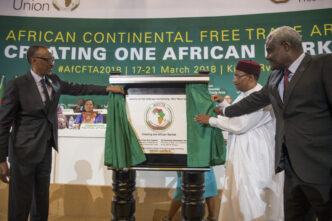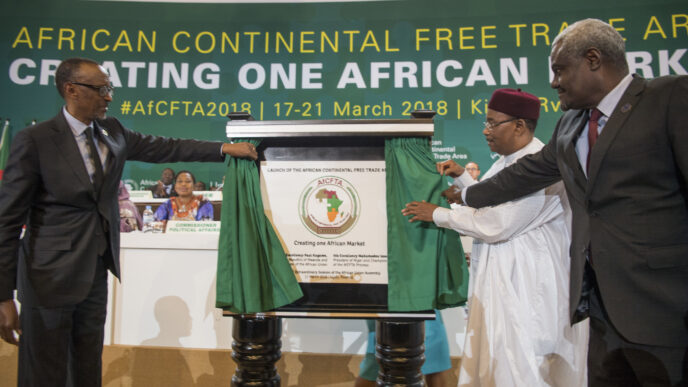BY ADEYINKA ADEDEJI
It is 133 years since the Nigeria Customs Service was established. A colonial construct, it shares a lot with some of its peers, like the Nigeria police, the Nigeria army, the correctional service, and several other public institutions.
However, arguably more than any of the others, it has had to deal with serial changes: changes in its enabling laws, changes in purpose, changes in structure, changes in strategy, changes in personnel, and many more. In the annals of Nigeria’s history, customs and change are synonymous.
At inception in 1891, over two decades before the amalgamation of the southern and northern protectorates and the colony of Lagos to form Nigeria in 1914, it was saddled solely with revenue collection. This changed in 1945 when the role of border policing, to prevent smuggling and associated activities, was added to its function. Since then, the Nigeria Customs Service has gone through several other changes, including movement of its supervising ministry from finance to internal affairs and back to finance.
Advertisement
That theme of change continued under President Muhammadu Buhari. For the eight years that he was in office, he placed the Nigeria Customs Service under the leadership of a retired Nigerian soldier, Colonel Hamid Ali. It was the first time in more than three decades that “an outsider” was brought in to superintend over this important national institution. Despite his military mien, Colonel Ali’s tenure was not devoid of controversy; from his long-running brickbat with the national assembly over his refusal to wear the NCS uniform, to dwindling staff morale at the top echelon, and the $3.1 Billion Customs Modernisation Project that has been hobbled by multiple litigations.
It was against this background that President Bola Tinubu, less than a month after assuming office, appointed Mr Bashir Adewale Adeniyi to the position of comptroller-general of customs (CGC). A career customs officer, Adeniyi had risen through the officer cadre of the service, holding important positions across different specialities. At different times, he was the public relations officer of the NCS; area controller at the nation’s principal gateway, the Murtala Muhammed Airport; and Commandant of the Nigeria Customs Command and Staff College. All these gave him the multi-disciplinary professional exposure and experience that are critical to leading the NCS. Clearly, Adeniyi came well-prepared for the position of CGC.
But it is one thing to come well prepared for the job. It is another to deliver on the job. Over the one year that he has been in office, that is what Adewale Adeniyi has done – deliver on the job! Despite the headwinds that have stalled much of the nation’s economy, the performance results of the Nigeria Customs under Adeniyi have been remarkably stellar.
Advertisement
Take revenue generation, arguably its most critical task. In one year, the NCS under Adeniyi has nearly doubled its revenue, from N2.6trillion (June 2022 to May 2023) to N4.5trillion in the following 12 months. That is a 74% increase. Even more impressive, there is a 70% increase in average monthly revenue, which is evidence of a constant push for improvements and excellence. For the Tinubu government which is desperately searching for financial resources to meet pressing demands, the NCS has come through.
In other areas, the NCS’s performance in the one year under Adeniyi’s leadership has been no less exceptional. Its anti-smuggling efforts have seen a record number of seizures at the borders, ranging from arms and ammunition, pharmaceuticals (including fake and sub-standard products), rice and other grains. The resumption of petroleum smuggling, initially curtailed by the removal of fuel subsidy at the start of the Tinubu administration, is now being met with improved surveillance and enforcement. This has already yielded fruit, with nearly 3 million litres of petrol seized so far.
Perhaps the best measure of the impact of the comptroller-general is in the meteoric rise of the NCS in the Presidential Enabling Business Environment Council (PEBEC) ranking. When he assumed office in June 2023, the NCS was 34th on the log table of 39 federal agencies and parastatals, with a score of 18.53%. One year later, it is tied for 1st with a 100% score. The import of this is telling, for it shows a complete turn around in the operations of the NCS with a renewed focus on trade facilitation. In a competitive world where ease of doing business is key to driving foreign direct investment, the NCS is clearly doing its part for Nigeria.
Yet the last year has not been smooth sailing. There was the stampede that resulted from the distrubution of rice, an unfortunate outcome of an altruistic gesture to alleviate the plight of citizens. There remains also the challenge of gaining the public’s utmost confidence in the anti-corruption fight. The modernisation project remains stuck in the law courts, thereby hindering the NCS from maximising technology to improve its efficiency. All these and more are challenges that the comptroller-general must continue to seek and implement innovative solutions, to complement his efforts on the core mandate of the NCS.
Advertisement
For now, Bashir Adewale Adeniyi has proven to be a right peg in the rounded hole of the Nigeria Customs Service. In him, Officers and men of the customs have a leader who deeeply loves the institution and represents their yearnings and aspirations. The impact of his one year in office has shown that he is doing his very best to position the NCS to meet and surpass the expectations of the country, and the demands of a technology-driven world. A definite plus for the government and people of Nigeria!
Adedeji is a business executive and writes from Lagos
Advertisement
Views expressed by contributors are strictly personal and not of TheCable.
Add a comment








